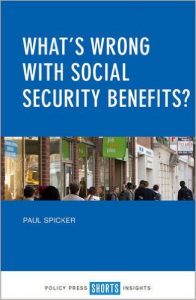It’s been announced, in various fora, that the government will propose in a forthcoming White Paper to abolish or reform the Work Capability Assessment. This is the pro-forma points system used to determine whether or not a person has limited or no capability for work.
The government’s priorities lie in ‘supporting’ people into work, rather than determining whether or not it is reasonable for people to work – which is supposed to be the legal test. We can probably all agree that the WCA is not a good test. It is slow, bureaucratic and rather bad at identifying what people’s circumstances actually are. Torsten Bell has suggested, on Twitter, that the actual plan is to replace the WCA with the test for PIP – a different kind of test, but still one which has little to do with capacity.
 Calling for reform doesn’t imply, as some might think, that the process of certification should go back to GPs, who have quite enough on their plate already. In my 2017 book, What’s wrong with social security benefits?, I made a series of proposals about how the WCA could be refomed. Here’s an extract.
Calling for reform doesn’t imply, as some might think, that the process of certification should go back to GPs, who have quite enough on their plate already. In my 2017 book, What’s wrong with social security benefits?, I made a series of proposals about how the WCA could be refomed. Here’s an extract.
As things stand, nearly everyone who claims is being assessed. … Although repeated checks on people with long-term conditions have now been acknowledged to be ‘pointless’, most of the assessments that remain are little better. They either confirm the obvious or they duplicate information that is already held. Some assessments are necessary: many people with disabilities cannot say whether they are disabled or not, and have no idea whether or not their disability fits the criteria for benefits. Any general rule, no matter how sensitively it is administered, is going to have to deal with some grey areas. But the same approach does not have to apply to everyone.
First, it is possible to identify certain conditions which should imply automatic entitlement, offering benefits on minimal or secondary evidence – either accepting on sight that the person has a qualifying disability (double amputation, severe disfigurement) or passporting benefits on the basis of provision by other agencies (congenital disability, blindness).
Second, there are conditions which will have led to prolonged long term contact with health services, and certification from a consultant is sufficient to establish that the condition is there without requiring further detailed examination of personal circumstances. Examples are terminal illness, multiple sclerosis, MND, malignant neoplasms or brittle bones.
Third, there are conditions where existing services in long-term contact with the individual are far better placed to judge the impact of a condition than an independent assessor could be, and it would be appropriate to accept medical certification. Examples are continued psychosis, epilepsy, dementia and learning disability.
Only after these three categories are considered is it appropriate to think in terms of further individual assessment. The points scheme currently used in a range of benefits was initially developed from work to establish the range and severity of disabilities in the UK. That research validated the approach through a range of tests, but it pointed to an important conclusion: that once the primary disabilities had been identified, it was very rare for further disabilities to make any notable difference to the findings, and that information served no useful purpose. It follows that it is neither appropriate nor necessary to ask most claimants whether they can go to the toilet unaided. The question is embarrassing and the information obtained is for the most part irrelevant. The assessment process should begin by asking people to identify their most important disabilities, ask questions about those, and go further only in marginal or complex circumstances.
Finally, there will be a residual category of people who are not adequately dealt with by any of the four stages above, and who will require or ask for a more thorough comprehensive assessment. This category should be small.